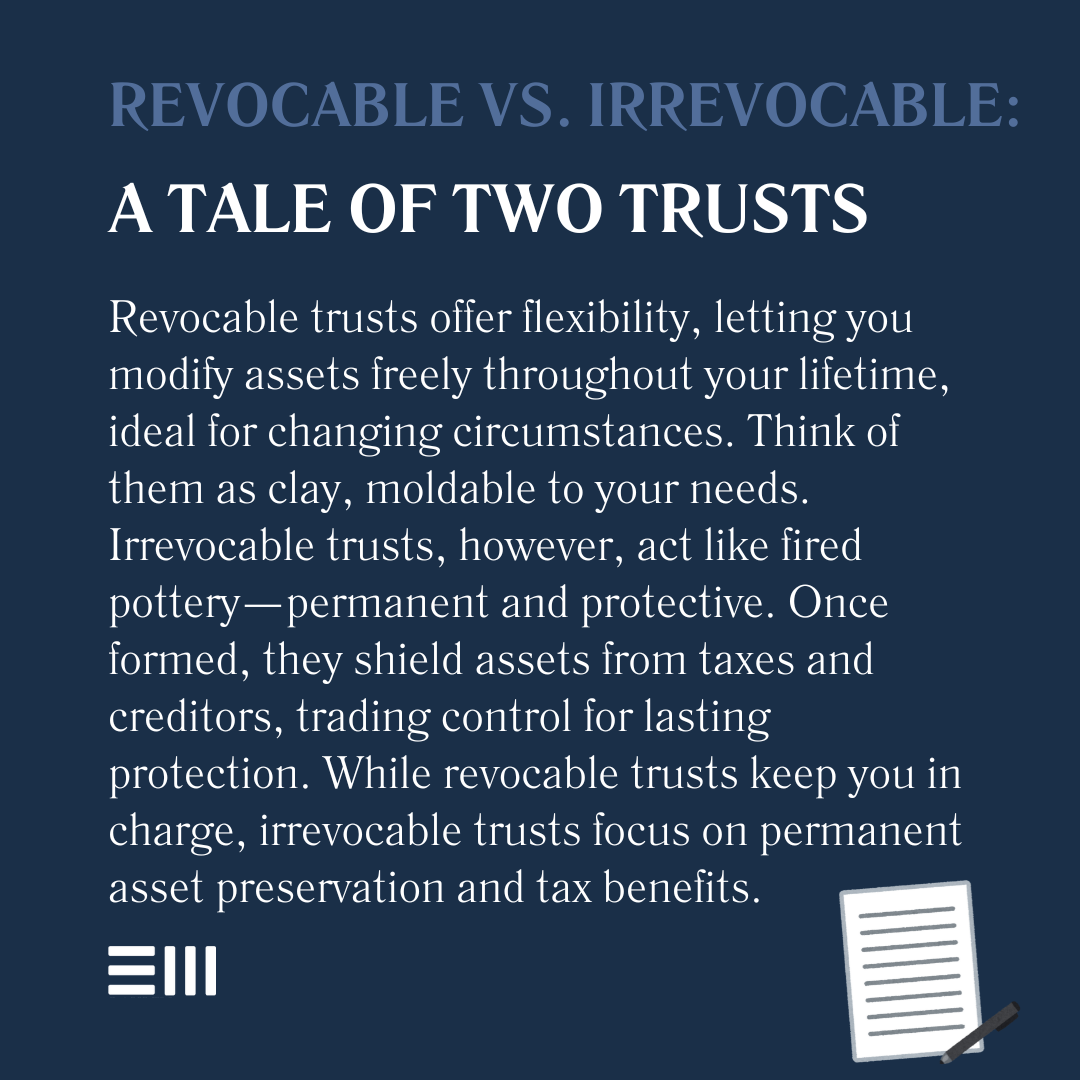Picture the peace of mind that comes with knowing your family home, retirement savings, and life's work are protected—not just for your children, but for generations to come.
While both revocable and irrevocable trusts can safeguard your legacy, choosing between them shapes how your assets are protected, who controls them, and even how much of your wealth reaches your loved ones.
For Alabama families, this decision carries lasting implications that echo through generations.
Understanding Trust Basics
Estate planning offers various tools to protect your assets and provide for your loved ones, with trusts being among the most powerful options available.
Before diving into the specific differences between revocable and irrevocable trusts, let's establish a foundation of trust fundamentals that will help you make an informed decision.
Trust creation involves three key parties: the grantor (who establishes the trust), the trustee (who manages the trust), and the beneficiaries (who receive benefits from the trust).
Understanding these roles helps clarify how different trust types function in practice. Each party holds specific responsibilities and rights, creating a framework for effective asset management and transfer.
The trust document itself serves as a comprehensive blueprint, outlining everything from asset distribution rules to successor trustee appointments. This legal framework ensures your wishes are carried out precisely as intended, providing peace of mind for you and your beneficiaries.
Revocable Living Trusts
A revocable living trust provides flexibility and control while you're alive, allowing you to maintain authority over your assets. This trust type serves as a cornerstone of many Alabama estate plans, offering unique advantages for asset management and probate avoidance.
Key benefits of revocable living trusts include:
- Complete control over assets during your lifetime, including the ability to buy, sell, or transfer property;
- Flexibility to modify or revoke the trust at any time as circumstances change;
- Seamless transfer of assets to beneficiaries after death without court intervention;
- Enhanced privacy protection through probate avoidance, keeping family matters confidential;
- Simplified asset management during incapacity through successor trustee provisions; and
- Consolidation of assets under one management structure for easier administration.
While revocable trusts offer significant benefits, they don't provide asset protection from creditors or tax advantages.
Understanding these limitations helps determine if this trust type aligns with your estate planning goals.
Many Alabama families choose revocable trusts as their primary estate planning tool, complementing them with other strategies to address specific needs.
Irrevocable Trusts
Irrevocable trusts represent a permanent transfer of assets, offering powerful protection and tax benefits in exchange for relinquishing control.
These trusts serve specific purposes in estate planning and require careful consideration before implementation. The permanence of this arrangement creates both opportunities and challenges for grantors and beneficiaries.
Notable features of irrevocable trusts include:
- Robust asset protection from creditors and legal judgments through complete transfer of ownership;
- Significant potential reduction in estate tax liability by removing assets from your taxable estate;
- Specialized protection of government benefits for special needs beneficiaries while maintaining quality of life;
- Generation-skipping transfer tax advantages for multi-generational wealth preservation;
- Professional asset management options ensuring long-term financial stability;
- Charitable giving opportunities with tax advantages; and
- Protection against spendthrift tendencies of beneficiaries.
The permanence of irrevocable trusts makes them particularly suitable for specific estate planning objectives, but their inflexibility requires thorough consideration before establishment. Working with experienced counsel helps ensure the trust structure aligns with your long-term goals.
Key Differences Between Trust Types
Understanding the distinctions between revocable and irrevocable trusts helps inform your estate planning decisions.
Each type serves different purposes and offers unique advantages based on your specific circumstances and goals for wealth preservation.
Major differences include:
- Control and modification rights, with revocable trusts offering flexibility and irrevocable trusts providing permanence;
- Asset protection capabilities, where irrevocable trusts excel in shielding wealth from creditors;
- Tax implications and benefits, particularly regarding estate tax reduction strategies;
- Privacy considerations and probate avoidance features;
- Implementation complexity and ongoing administration requirements;
- Cost considerations for establishment and maintenance;
- Impact on government benefit eligibility; and
- Creditor protection levels for both grantors and beneficiaries.
These differences significantly impact which trust type best serves your estate planning needs and long-term financial objectives. Understanding how each type aligns with your goals helps create an effective estate plan.
Common Questions About Alabama Trusts
Trust planning raises numerous questions for Alabama residents seeking to protect their assets and provide for their loved ones.
Here are answers to frequently asked questions about revocable and irrevocable trusts.
How Does Asset Protection Differ Between Trust Types?
While revocable trusts offer no asset protection during your lifetime, irrevocable trusts can shield assets from creditors and legal claims. This protection stems from permanently transferring ownership of assets out of your name.
What Are the Tax Implications of Each Trust?
Revocable trusts provide no tax advantages during your lifetime, as assets remain part of your taxable estate. Irrevocable trusts can reduce estate tax liability by removing assets from your estate entirely.
Can I Serve as Trustee of My Own Trust?
You can serve as trustee of your revocable trust, maintaining complete control. However, serving as a trustee of your irrevocable trust may negate its tax and asset protection benefits.
How Do These Trusts Affect Medicaid Planning?
Irrevocable trusts may help protect assets while qualifying for Medicaid, subject to look-back periods. Revocable trusts offer no Medicaid planning advantages as assets remain accessible.
What Happens to These Trusts After Death?
Both trust types can distribute assets according to your wishes after death, but irrevocable trusts maintain their asset protection and tax benefits for beneficiaries.
Trust Planning in Alabama
Alabama's trust laws offer unique considerations for both revocable and irrevocable trusts. Understanding state-specific regulations ensures your trust works as intended within Alabama's legal framework.
Key Alabama considerations include:
- State-specific trust registration requirements;
- Alabama trust taxation rules;
- Local asset protection statutes;
- State probate procedures; and
- Alabama trust administration guidelines.
Proper attention to these state-specific factors helps ensure your trust achieves its intended purposes under Alabama law.
Take the Next Step in Securing Your Legacy
Your family's financial security deserves experienced legal guidance. Our trust and estate planning attorneys have helped hundreds of Alabama families protect their assets and create lasting legacies through carefully structured trusts.
Contact us today for a confidential consultation to discuss your trust planning needs and discover which trust type best serves your family's future.


